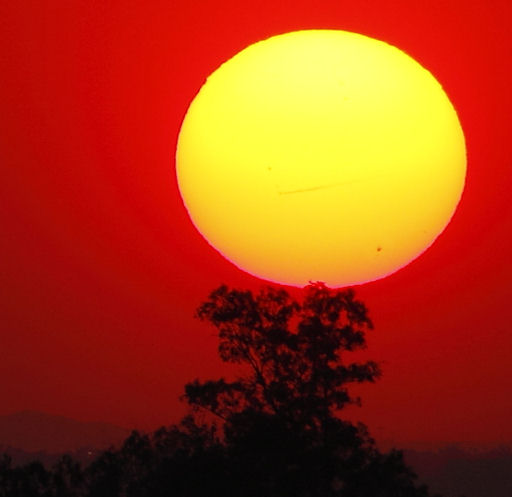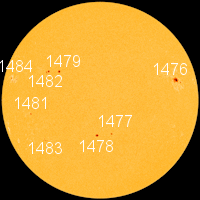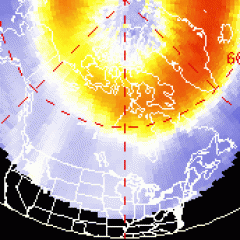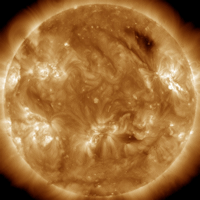MENACE UNREALIZED: After more than a week of solar storm warnings, sunspot AR1476 is turning away from Earth with a mostly unblemished record of quiet. The decaying behemoth never lived up to its potential as a source of X-class solar flares. It did, however, make a great target for astrophotographers. Even now the sunspot is decorating sunsets around the world:
Russ Vallelunga took the picture on May 14th from Papago Park in Phoenix, Arizona. "Wildfires around the Phoenix metropolitan area led to a dim setting sun," says Vallelunga. "This allowed me to capture the sunspots 1476 and 1478 with an exposure of 1/125 second at ISO 100." More photo details may be found here.
NOAA forecasters estimate a 15% chance of M-class flares and no more than a 1% chance of X-flares from AR1476 during the next 24 hours. The chance of photo-ops: 100%.
more images: from VegaStar Carpentier of Paris, France; from Mike Borman of Evansville, Indiana; from Maximilian Teodorescu of Dumitrana, Romania; from Alberto Lao of Binondo, Manila, Philippines; from Art Whipple of Tracys Landing, Maryland; from John W. O'Neal II of Amherst, Ohio; from Pete Lawrence of Selsey, West Sussex, UK; from Göran Strand of Frösön, Jämtland; from Eric von der Heyden of Traisa, Hessen, Germany

![]()
Solar wind
speed: 372.1 km/sec
density: 3.5 protons/cm3
explanation | more data
Updated: Today at 1735 UT
![]()
X-ray Solar Flares
6-hr max: C1 1700 UT May15
24-hr: C1 0945 UT May15
explanation | more data
Updated: Today at: 1700 UT
![]()
![]()
![]()
Daily Sun: 15 May 12
![]()
![]()
Decaying sunspot 1476 poses a declining threat for M-class solar flares. Credit: SDO/HMI
![]()
![]()
![]()
Sunspot number: 156
What is the sunspot number?
Updated 14 May 2012
Spotless Days
Current Stretch: 0 days
2012 total: 0 days (0%)
2011 total: 2 days (<1%)
2010 total: 51 days (14%)
2009 total: 260 days (71%)
Since 2004: 821 days
Typical Solar Min: 486 days
Updated 14 May 2012
The Radio Sun
10.7 cm flux: 130 sfu
explanation | more data
Updated 14 May 2012
![]()
![]()
![]()
Current Auroral Oval:
![]()
Switch to: Europe, USA, New Zealand, Antarctica
Credit: NOAA/POES
![]()
![]()
![]()
Planetary K-index
Now: Kp= 1 quiet
24-hr max: Kp= 2 quiet
explanation | more data
![]()
Interplanetary Mag. Field
Btotal: 5.9 nT
Bz: 2.4 nT north
explanation | more data
Updated: Today at 1736 UT
![]()
![]()
![]()
Coronal Holes: 15 May 12
![]()
![]()
There are no large coronal holes on the Earthside of the sun. Credit: SDO/AIA.





